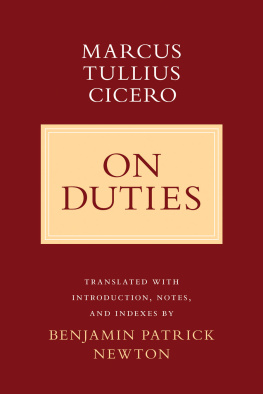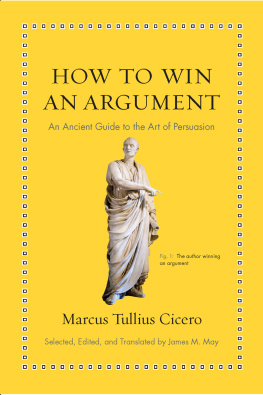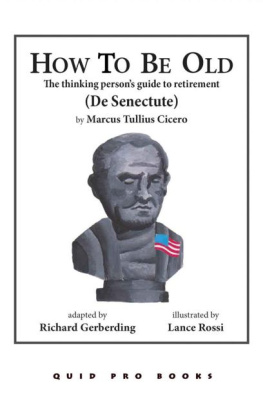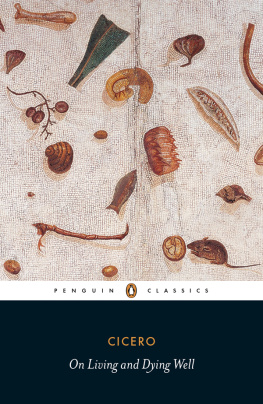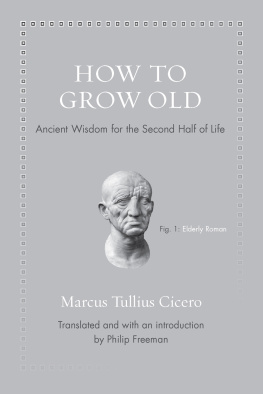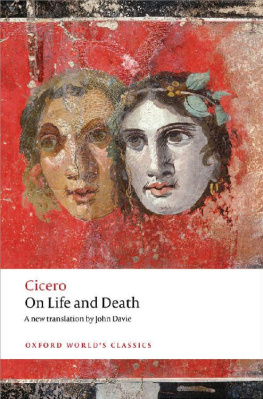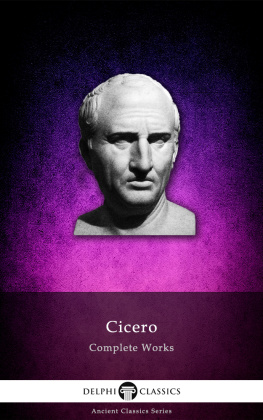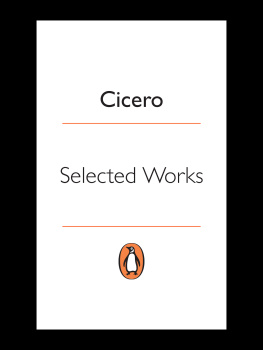HOW TO WIN AN ELECTION
HOW TO WIN
AN ELECTION

An Ancient Guide for Modern Politicians
Quintus Tullius Cicero
Translated and with an introduction by
Philip Freeman
PRINCETON UNIVERSITY PRESS
PRINCETON AND OXFORD
Copyright 2012 by Philip Freeman
Requests for permission to reproduce material from this work should be
sent to Permissions, Princeton University Press
Published by Princeton University Press, 41 William Street,
Princeton, New Jersey 08540
In the United Kingdom: Princeton University Press, 6 Oxford Street,
Woodstock, Oxfordshire OX20 1TW
press.princeton.edu
All Rights Reserved
Library of Congress Cataloging-in-Publication Data
Cicero, Quintus Tullius.
[Commentariolum petitionis. English]
How to win an election : an ancient guide for modern politicians /
Quintus Tullius Cicero ; translated and with an introduction by
Philip Freeman
p. cm.
Includes bibliographical references and index.
ISBN 978-0-691-15408-4 (hardcover : acid-free paper)
I. Freeman, Philip, 1961- II. Title.
PA6371.C4A24 2011
324.720937dc23
2011034838
British Library Cataloging-in-Publication Data is available
This book has been composed in Garamond and Futura
Printed on acid-free paper.
Printed in the United States of America
1 3 5 7 9 10 8 6 4 2
CONTENTS
INTRODUCTION
In the summer of 64 BC, Marcus Tullius Cicero, the greatest orator ancient Rome ever produced, was running for consul, the highest office in the Roman Republic. He was forty-two years old, the son of a wealthy businessman from the small town of Arpinum south of Rome. His father had seen that Marcus and his younger brother Quintus received the finest education and had even sent the boys to Greece to study with the most noted philosophers and orators of the day.
Marcus was a gifted speaker and possessed a brilliant mind equal to his golden tongue. What he lacked was the advantage of noble birth. Ancient Roman society was highly class-conscious and dismissed men such as Marcus Cicero as unfit to preside over the republic. He was determined to prove them wrong.
As a young man Marcus had completed an undistinguished year in military service under the father of the future Roman general Pompey the Great, who would one day defend the state against Julius Caesar. This younger Pompey became a patron of Marcus and helped him in his subsequent political career. At twenty-five, Marcus won his first case in the Roman courts defending a well-connected man against murder charges. His reputation grew in the years to follow as he successfully represented many prominent menvictories that also helped him rise through the political ranks of the republic. He had already served admirably in the important but lesser offices of quaestor and praetor. However, no man outside the noble families had been elected as a consul for thirty years, making the attainment of this ultimate goal by Marcus unlikely.
Yet in 64, the other candidates for the consulshipmost notably Antonius (known as Hybrida) and Catilinewere such an unsavory lot that some of the nobility held their noses and threw their support behind Marcus Cicero. Still, the thought of an outsider from a small town being one of the two consuls to govern the ancient republic, ruler of millions across the Mediterranean lands, was too much for many of the blue-blooded families to stomach. Marcus was going to have a long and difficult campaign if he was going to win.
At this point the more practical Quintus decided that his elder brother needed some advice. Quintus was four years younger than Marcus, with a fiery and sometimes cruel temperament. Although overshadowed by his elder sibling, he was fiercely loyal to Marcus and recognized that his brothers success would pave his own way to fame and fortune. He had even married the headstrong Pomponia, sister of Marcuss best friend Atticus, and fathered a son with her two years earlier, though the marriage was always rocky.
As the campaign for consul was beginning, Quintus wrote a short pamphlet to Marcus on electioneering in the form of a letter. The result is a little-known text that has somehow survived the centuries, called in Latin the Commentariolum Petitionis. Some specialists in Roman literature doubt that Quintus wrote the work, believing it was another contemporary or perhaps a Roman from the following century. Others would agree that Quintus was indeed the author. What matters, however, is not the identity of the writer but what he says. The author was clearly someone intimately familiar with Roman politics in the first century BC who possessed a keen sense of how elections are won in any age.
Rome in the days of the Cicero brothers was a vast empire run as if it were still a small town nestled among seven hills along the Tiber River. Politics was deeply personal, controlled by a few leading families of the city, and centered around the Roman Forum, a former swamp in the center of town. Although Roman citizens lived across the Mediterranean region, there was no such thing as an absentee ballot. All campaigning was done by candidates within the city of Rome or in nearby towns.
Any Roman who aspired to the consulship was required, after obligatory military service, to be elected first to a series of lower offices known as the cursus honorum, or path of honors. The first step in this long process was to be chosen around the age of thirty as one of the quaestors elected each year to manage the mundane tasks of governance, such as running the treasury. Service as a praetor came next, and brought with it such responsibilities as managing the courts, after which a man might be sent abroad to govern a Roman province. Only a few would choose to campaign for the ultimate prize, the office of consul. These two annual magistrates held supreme executive power over the republic and were responsible for both civil and military affairs. Election to the consulship was jealously guarded by the aristocracy of Rome, for service in this highest office granted a man and his descendants the coveted status of nobility.
The Romans scoffed at the Greek idea of one man, one vote as an invitation to mob rule. Any adult male citizen could cast a ballot, but this was done in a complicated system of groups. Individuals helped determine how their own group would vote, but it was the group itself that cast a single vote within the assembly. These groups might be military in origin (centuries) or tribal, but by the time of Cicero their original significance had been replaced by class designations based on wealth. The richest citizens held a disproportionate degree of power over the much more numerous lower classes. Often a sufficient number of ballots would be cast to elect a candidate even before the poorer citizens could come to the polls. The system also favored those who lived in or near Rome, since voting had to be done in person. A farmer or merchant of modest income living far from the city was unlikely to make the journey to cast his ballot.
Yet for those citizens who lived in the capital or had the means to travel to Rome for elections, the process of choosing consuls was orderly and usually fair, in spite of the rampant bribery and occasional violence of the campaigns. Citizens would gather early in the morning on the nearby Campus Martius to hear final speeches, then divide into their centuries in roped-off areas to cast their votes. Voting was by secret ballot, as each man wrote the name of his favored candidate on a small wax-covered wooden tablet and placed it in a large wickerwork basket. The votes of each group were announced as soon as they were tabulated. The first candidate to achieve a majority according to the system was declared the winner, with the man placing second in the polls named as the junior consul. The senior consul could then take up the


